Photographs: Reuters Joe Matthew in New Delhi
A few days earlier, clinical trial investigators in Pune, Vellore and Delhi completed vaccinating 6,800 infants with Rotavac, an experimental rotavirus vaccine being developed by Hyderabad-based Bharat Biotech.
The vaccination was part of the final phase (phase III) of clinical trials, which began about 12 years before. A couple of months from now, these trial results will be out and Bharat Biotech stands a fairly good chance to market India's first ever indigenous vaccine that prevents the lethal rotavirus diarrhoea, that (as estimated by the World Health Organisation) kills 100,000 children below the age of five in India every year.
Bharat will become only the fourth company globally that has developed this new generation of vaccine when it becomes available in the market in a year or two.
...
Vaccine makers give India shot in the arm
Photographs: Bernardo Montoya/Reuters
Rotavac is not an isolated case. India's handful of vaccine makers -- Panacea, Serum, Zydus Cadilla, Shantha and others -- are busy developing many more, helping the country shed its image as just another manufacturing hub of traditional vaccines like polio, tetanus and diphtheria to a place where newer, more cutting-edge work in the vaccine world takes place.
Emerging capability
This ability to move up the vaccine value chain became discernable on the world stage during the outbreak of H1N1 (swine flu).
Within a year's time, nearly half a dozen companies were ready with the H1N1 vaccine. Zydus Cadilla, the Ahmedabad-based drug major which was first to launch the H1N1 vaccine in 2010-11, has since commissioned a new state-of-the-art Vaccine Technology Centre (VTC) with 60 dedicated scientists to run multiple vaccine research programmes.
...
Vaccine makers give India shot in the arm
Photographs: Reuters
Deepak Gaur and Virander S Chauhan of the International Centre for Genetic Engineering and Biotechnology, New Delhi, say these are early indications of Indian firms beginning to make inroads into innovative health product discovery and development.
"Shantha Biotech and Serum Institute of India are both working to develop a pentavalent vaccine to protect against five infectious agents, including DPT, Hepatitis-B and Haemophilus influenza type B (Hib)," say Gaur and Chauhan in a recently published research paper.
"Bharat Biotech International is in the process of developing novel vaccines against malaria, typhoid, Japanese encephalitis and chikungunya. In addition, companies such as Panacea Biotec, Biological E, Bhat Biotech, Bharat Serums and Vaccines and Transgene Biotek are developing novel vaccines against many locally relevant diseases," the researchers point out.
...
Vaccine makers give India shot in the arm
Photographs: Jonathan Ernst/Reuters
In fact, Shantha's Shanvac-B, the indigenously developed Hepatitis B vaccine, had pioneered this trend over a decade ago, when Shanvac-B was priced less than $1 a dose, as compared to the prevailing $23 a dose cost of imported Hepatitis-B vaccine. Shantha was later acquired by French drug major Sanofi-Aventis.
Price warriors
The opportunity for these vaccine makers may in fact not be too far from their own doorsteps. According to a McKinsey report on the Indian pharmaceutical sector, "at two per cent penetration, the vaccines market of India is significantly under-penetrated.'' It is estimated the current Indian vaccine market is around $900 million, with a potential to touch $4.6 billion by 2017.
However, this doesn't mean Indian vaccine makers are hoping to make a windfall profit through premium pricing in an underserved market. The model most Indian vaccine makers follow is similar to what domestic generic drug companies have been doing for a long time. Much like Indian generic medicines, Indian vaccines are also being projected as low-cost alternatives to high-priced vaccines produced by global majors.
...
Vaccine makers give India shot in the arm
Photographs: Reuters
The Serum Institute of India, one of the country's leading vaccine producers, claims "two of every three children immunised in the world is vaccinated by a vaccine manufactured by Serum Institute". The company's products, used in 140 countries, are again known for their low cost.
Krishna Ella, chairman of Bharat Biotech, recently reiterated a promise he made when his company had initiated the development of Rotavac a decade ago, that the vaccine, as and when approved, will be priced below $1 a dose for global supplies.
In essence, as new-generation vaccines emerge, India's vaccine market will transition from being a publicly-funded initiative to a private business where vaccines are prescribed by private practitioners across the country.
...
Vaccine makers give India shot in the arm
Photographs: Reuters
"The 330 million (middle class) people in India, who are not price-sensitive, will drive private market sales in the domestic vaccine segment,'' predicts N K Ganguly, former chief of the Indian Council of Medical Research.
Experts say at least three domestic vaccine companies are trying to make low cost versions of a cervical cancer vaccine (HPV vaccine) through non-patent infringing methods.
"Once such new vaccines start coming into the market, the vaccine industry will grow irrespective of the inclusion of the products in the national immunisation list," Ganguly says.
...
Vaccine makers give India shot in the arm
Photographs: Yuri Maltsev/Reuters
Unique partnerships
"Normal understanding of financial returns will not work in the vaccine industry. In vaccines, partnerships with government, universities, medical colleges are all essential", says Rajesh Jain, joint managing director, Panacea Biotec.
And, that kind of collaboration is a reality -- indeed, a necessity -- in India today. Bharat Biotech's Rotavac was developed through a public-private partnership that involved the Department of biotechnology, the Bill Gates Foundation, the Programme for Appropriate Technologies in Health, Centre for Disease Control, National Institutes of Health, All India Institute of Medical Sciences and some others.
The Japanese encephalitis vaccine, undergoing Phase-II clinical trials in India, is being developed by Hyderabad-based Biological E, in partnership with an Australian company Intercell.
...
Vaccine makers give India shot in the arm
Photographs: Reuters
Criticisms
Still, amidst all the positive developments in vaccines, the growth in vaccine research and marketing is not immune to controversy.
The manner in which post-marketing trials of cervical cancer vaccines were conducted by two global vaccine majors through partnerships in India witnessed a major controversy in the recent past.
In a critique last month, Delhi-based researchers Y Madhavi and N Raghuram severely criticised the central government's 'National Vaccine Policy 2011' as they feel the new policy, meant to encourage vaccine development in the country, "is more about spending and coverage, than about protecting children".
...
Vaccine makers give India shot in the arm
Photographs: Michael Buholzer/Reuters
"It is not designed to enhance national public capacities for public immunisation programmes, but to justify spending public money on public-private partnerships or privately produced vaccines in the name of protection from diseases, whose incidence figures and public health statistics are dubious and industry manufactured,'' they alleged.
Still, criticisms aside, experts feel the vaccine industry is set to grow faster than the conventional pharmaceutical sector in the coming years.
That's good news for consumers looking for inexpensive ways to protect themselves from potentially life-crippling diseases.

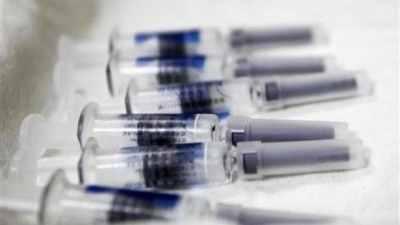


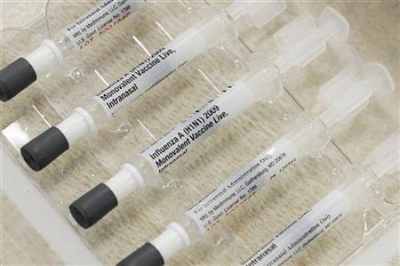
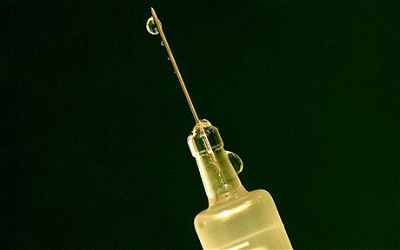

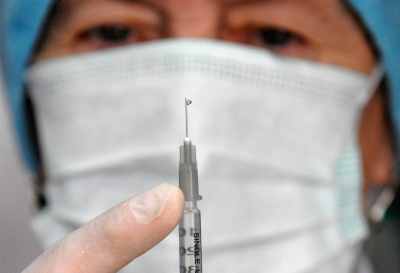
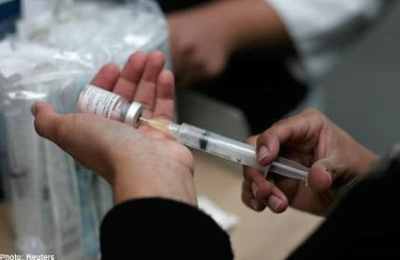
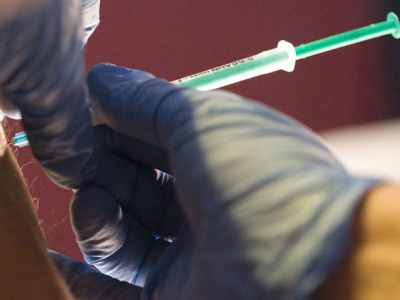

article